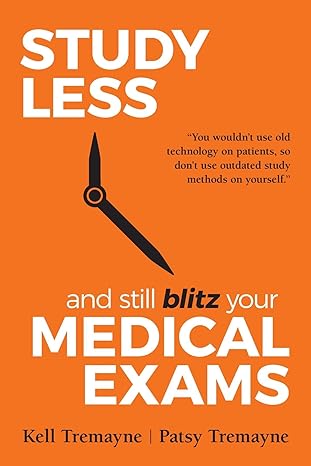Wellbeing Isn’t a Luxury - It's Your Secret Weapon for Exam
Success
Because passing your exam shouldn’t mean sacrificing your health.
If you're a doctor preparing for a high-stakes exam, chances are you've put your life on pause.
Social plans? Cancelled....Gym sessions? Skipped....Hobbies? Forgotten....All in the name of study.
You’re not alone. We’ve spoken to countless doctors who’ve done the same—sacrificing everything outside of study in the hope that more hours at the desk will lead to better results. It’s a mindset rooted in dedication, discipline, and the pressure to succeed.
But here’s the twist: this approach might actually be holding you back.
When you cut out the very things that support your mental and physical wellbeing—movement, rest, connection, joy—you’re not freeing up time. You’re draining your energy. You’re asking your brain to perform at its best while depriving it of the fuel it needs to function.
It’s like trying to run a marathon on no sleep and an empty stomach. You might make it a few kilometres, but eventually, you’ll hit a wall.
What if, instead of pushing harder, you started supporting your brain to work smarter?
What if your next breakthrough didn’t come from another late-night cram session—but from a walk, a nap, or a laugh with a friend?
Here we flip the script and show you that wellbeing isn’t a distraction from your study—it’s the foundation of your success.
Let’s explore how simple shifts in your daily routine—like prioritising sleep, moving your body, and taking intentional breaks—can dramatically improve your focus, memory, and resilience.
Because you don’t have to choose between passing your exam and taking care of yourself. You can do both—and do them better.
The Pit Stop That Powers Performance
Let’s talk Formula 1 for a second. These cars are engineering marvels, flying around tracks at over 320 km/h. But even the best car can’t finish a race without a pit stop. It needs to pause—change tires, refuel, make adjustments. That short break? It’s the difference between winning and breaking down.
Now think of your brain as that high-performance machine. Your “pit stops” are moments of recovery—exercise, sleep, time with loved ones, even a walk outside. These aren’t distractions from study. They’re what make your study effective.
Why Wellbeing Isn’t Optional
The World Health Organization defines health as a “state of complete physical, mental, and social wellbeing—not merely the absence of disease.” That’s not just a nice idea. It’s a strategy.
When you’re physically active, mentally rested, and socially connected, your brain works better. You retain more. You focus longer. You bounce back from stress faster.
But here’s what we see all the time: doctors pushing everything aside to study. Exercise? Later. Friends? Maybe after the exam. Family time? On hold.
And what happens?
- Quality of life drops
- Stress and burnout rise
- Brain performance suffers
If you're searching for how to stay healthy while studying for medical exams, this is your answer: wellbeing is not a luxury—it’s your foundation.
Exercise: The Brain’s Magic Pill
Imagine a pill that helps you sleep better, feel less stressed, look healthier—and boosts your memory and focus. That pill exists. It’s called exercise.
Dr. John Ratey, a Harvard psychiatrist and author of Spark: The Revolutionary New Science of Exercise and the Brain, explains that exercise improves learning in three powerful ways:
- It balances neurotransmitters that help with focus and attention
- It grows new brain cells in the hippocampus (your memory center)
- It strengthens connections between neurons—making memories stick
Even a short burst of movement before studying can improve how well you learn and remember. One study found that just 2 to 60 minutes of moderate to intense activity (like walking or cycling) before study significantly boosted memory retention for the next two hours .
So next time you think, “I don’t have time to exercise,” remember: you don’t have time not to. If you're looking for quick workouts for doctors during exam prep, even a 10-minute session can make a difference.
Sleep: Your Brain’s Overnight Upgrade
Sleep isn’t just rest—it’s when your brain does its best work. During sleep, your brain consolidates memories, clears out toxins, and resets for the next day.
Cutting sleep to study more? That’s like skipping the pit stop in a race. You might gain a lap, but you’ll lose the race.
Prioritising sleep means:
- Better memory
- Sharper focus
- More emotional resilience
- Stronger immune function
In short, sleep is study time—just in a different form. If you're wondering about the importance of sleep for exam prep, this is your sign to make it a priority.
Real Talk: What Doctors Tell Us
“I’ve put everything aside to study. I’m exhausted. I’m missing out on my kids. I’m not exercising. I’m not sleeping well. I feel like I’m falling apart.”
Sound familiar?
You’re not alone. And you’re not failing. You’re just running on empty.
The good news? Small changes can make a big difference. A 10-minute walk. A set bedtime. A short workout at home. These aren’t indulgences—they’re strategies.
Your Takeaway
Wellbeing isn’t a reward for passing your exam. It’s how you pass your exam.
So take your pit stops. Move your body. Get your sleep. Connect with people who lift you up. These are the things that fuel your brain—and your success.
Whether you're looking for doctor exam success strategies or ways to improve memory retention while studying, it all starts with taking care of you.
Want more
We've helped countless doctors pass their exams without burning out. Want to dive deeper?
[Grab the book] or [Book a free consultation session] to create your personalised wellbeing + study strategy.
Because you deserve to pass your exam—and feel good doing it.



